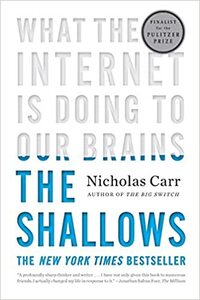Take a photo of a barcode or cover
informative
reflective
slow-paced
challenging
informative
reflective
slow-paced
Not as updated or compelling as I hoped. Still valuable information.
This book is a must-read. I was intrigued but a little nervous that it would be preachy or just a rehash of things I already agree with. Instead, he puts forth a bunch of interesting science about brain development and what impact our electronic media (including Goodreads) will have on how our brains develop. Fascinating stuff. I encourage everyone to read it.
If you think that technology has gone wild, then you're not alone. But what about the research? What does that suggest? If you're curious about this, then look no further than this book. Written over the course of two years, the book is impeccably researched. Rather than an anti-technology screed or a critique of the "amateur-ization of the web" along the likes of Andrew Keen's "The Cult of the Amateur", Carr in a measured fashion looks at the rise of the Net against its historical underpinnings. His balanced approach will resonate with even those who don't agree with his premise: that all of this time spent in front of screens (8.5 hrs/day for the average American) may be a good thing, but there are consequences.
Great read. One of the best books I've read in quite some time.
Great read. One of the best books I've read in quite some time.
informative
reflective
medium-paced
informative
medium-paced
I wanted to love this book, but I'm not an academic and found it a chore to get through. I agree with the premise - that the internet, with all of its email notifications, text messages, hyperlink temptations - is a symphony of distractions. And distractions are not your friend when you want to learn/own/remember information.
Enough ideas for a good magazine article? Yes. But an entire book?
Carr suggests that today's readers can no longer follow an extended argument because they spend too much time scanning text for keywords. And so I stuck with it, because I believed there would be a high pay-off. Alas, if there was one, I missed it. In hindsite, this was one that would have been better skimmed. :)
Enough ideas for a good magazine article? Yes. But an entire book?
Carr suggests that today's readers can no longer follow an extended argument because they spend too much time scanning text for keywords. And so I stuck with it, because I believed there would be a high pay-off. Alas, if there was one, I missed it. In hindsite, this was one that would have been better skimmed. :)
I've read a lot about the brain lately, and as a librarian I'm always reading up about the latest offerings in the way of webtools for schools, and it's very interesting to read something that binds the two fields together. Unfortunately, much of what I read in [bc:The Brain That Changes Itself: Stories of Personal Triumph from the Frontiers of Brain Science|570172|The Brain That Changes Itself Stories of Personal Triumph from the Frontiers of Brain Science|Norman Doidge|http://photo.goodreads.com/books/1312511658s/570172.jpg|557215] was repeated in this work. But it was very interesting to read some of the diversions which were a part of this book: Information about the development of the book, from clay tablets to modern books, with the debates about their merits which accompanied each incarnation, including many arguments from contemporary intellectuals and philosophers about the potential negative impacts on various preliterate skills such as oral tradition and memory, which might be affected by the reader's ability to write memos and lists.
Despite his following of many fallacious arguments from previous luddites, Carr comes down very heavily himself on the side of our diminishing ability to concentrate and understand and remember text in its latest iteration. And he's pretty convincing.
We have probably all noticed that it is much more difficult to take in the content of a news story when there is teletext moving along the bottom of the screen - well the same thing happens when hypertext is present in an online document, or a distracting ad is jumping up and down on your screen - your mind has to make a million little decisions about the relevance or otherwise of each distraction, and it basically uses up all our immediate memory, so we don't take in as well what we are reading. And with the following of hyperlinks etc we are getting unused to reading long stretches of text without distraction. Worst of all, these things which prevent us from concentrating well are, when teamed with the plasticity of the brain, changing our brains to make it more difficult for us to read or concentrate deeply.
If you're thinking about reading this book, you might be interested in listening to this mp3 of Carr on an interview in which he summarises much of what is covered in the book, without the tangents (though they are interesting!) http://www.abc.net.au/pm/content/2010/s3019138.htm
Despite his following of many fallacious arguments from previous luddites, Carr comes down very heavily himself on the side of our diminishing ability to concentrate and understand and remember text in its latest iteration. And he's pretty convincing.
We have probably all noticed that it is much more difficult to take in the content of a news story when there is teletext moving along the bottom of the screen - well the same thing happens when hypertext is present in an online document, or a distracting ad is jumping up and down on your screen - your mind has to make a million little decisions about the relevance or otherwise of each distraction, and it basically uses up all our immediate memory, so we don't take in as well what we are reading. And with the following of hyperlinks etc we are getting unused to reading long stretches of text without distraction. Worst of all, these things which prevent us from concentrating well are, when teamed with the plasticity of the brain, changing our brains to make it more difficult for us to read or concentrate deeply.
If you're thinking about reading this book, you might be interested in listening to this mp3 of Carr on an interview in which he summarises much of what is covered in the book, without the tangents (though they are interesting!) http://www.abc.net.au/pm/content/2010/s3019138.htm
I have a feeling that Carr could have stopped with his Atlantic article, "Is Google Making Us Stupid?" from a couple of years ago. This did not have be a whole book. But an interesting topic nonetheless.
I was interested in this topic, and picked this book since it was a Pulitzer runner-up; I hoped it would provide a balanced, objective overview of all sides of the issue, rather than a subjective rant about "kids these days".
55% done -- there was a great introduction to relevant neuroscience, and a surprisingly good overview of the history of communication, writing, etc... really, not much different from this XKCD (except for the girl's final comment): https://xkcd.com/1601/
Unfortunately, thus far there's a lot of hand-wringing about the demise of "deep reading" and the rise of web-style, rapid-fire "browsing" -- without much evidence that this is actually a bad thing. (i.e., it's exactly the kind of book I was hoping to avoid). After just a couple years interacting with the educational research world and learning about the rationale and evidence behind "active learning", even I (with my limited expertise) can tell he's leaving out part of the story. We'll see how the rest of this goes...
100%-done update: After finishing up the discussion above, there were pretty cool chapters built around Google, memories, and the Turing test. Overall, this book was a good overview of one side of the "Internet: good?" debate, but it was incredibly one-sided. The author obviously came in with his thesis established ("Deep reading" is dying, and that's VERY BAD), and found good evidence to support it. That's obviously an ok model for a book, but I was hoping for a more open-ended question (What is the internet doing to our brains?) and a thorough overview of *all* evidence involved.
As a counterpoint, I'd like to read Clive Thompson's "Smarter Than You Think: How Technology is Changing Our Minds for the Better," which seems to be the exact opposite of this book (a thorough overview of pro-internet brain research): "It's undeniable — technology is changing the way we think. But is it for the better? Amid a chorus of doomsayers, Clive Thompson delivers a resounding 'yes.'" https://www.goodreads.com/book/show/17707600-smarter-than-you-think
55% done -- there was a great introduction to relevant neuroscience, and a surprisingly good overview of the history of communication, writing, etc... really, not much different from this XKCD (except for the girl's final comment): https://xkcd.com/1601/
Unfortunately, thus far there's a lot of hand-wringing about the demise of "deep reading" and the rise of web-style, rapid-fire "browsing" -- without much evidence that this is actually a bad thing. (i.e., it's exactly the kind of book I was hoping to avoid). After just a couple years interacting with the educational research world and learning about the rationale and evidence behind "active learning", even I (with my limited expertise) can tell he's leaving out part of the story. We'll see how the rest of this goes...
100%-done update: After finishing up the discussion above, there were pretty cool chapters built around Google, memories, and the Turing test. Overall, this book was a good overview of one side of the "Internet: good?" debate, but it was incredibly one-sided. The author obviously came in with his thesis established ("Deep reading" is dying, and that's VERY BAD), and found good evidence to support it. That's obviously an ok model for a book, but I was hoping for a more open-ended question (What is the internet doing to our brains?) and a thorough overview of *all* evidence involved.
As a counterpoint, I'd like to read Clive Thompson's "Smarter Than You Think: How Technology is Changing Our Minds for the Better," which seems to be the exact opposite of this book (a thorough overview of pro-internet brain research): "It's undeniable — technology is changing the way we think. But is it for the better? Amid a chorus of doomsayers, Clive Thompson delivers a resounding 'yes.'" https://www.goodreads.com/book/show/17707600-smarter-than-you-think




